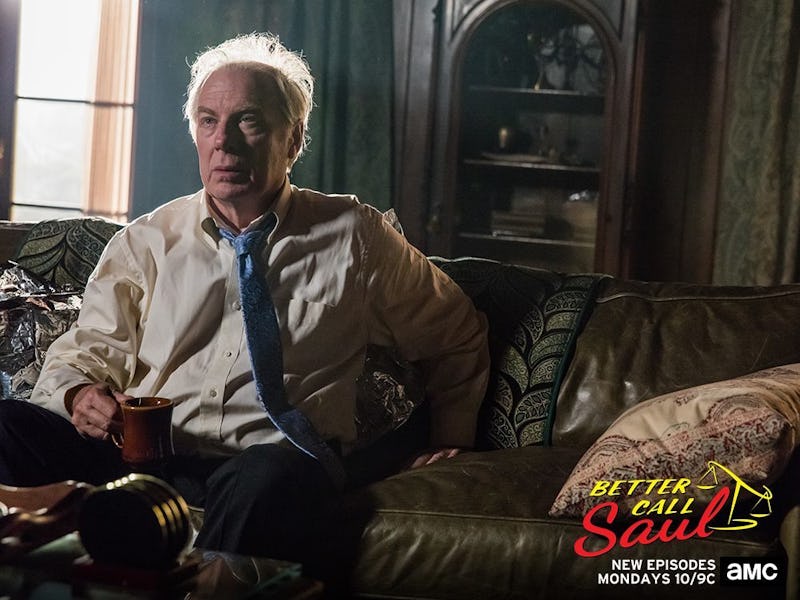'Better Call Saul' Channels Shakespeare in Second to Last Episode of the Season
The eloquent tête-à-tête between Chuck, Jimmy, and Kim in"Nailed" proved why the show is one of the best on TV.

Last night’s “Nailed,” the penultimate episode of Better Call Saul’s second season, was a reaction episode. The cause was set up in last week’s “Fifi,” which featured the giddily hilarious and simultaneously tragic montage of Jimmy (Bob Odenkirk) actively sabotaging Chuck’s dealings to pull the big Mesa Verde account away from Kim (Rhea Seehorn). Kim had cut herself loose from HHM to form her own individual-but-together practice with Jimmy. The younger McGill’s late night meticulousness in cutting, pasting, and copying the wrong address onto HHM’s lucrative documents was a big win for the small-time con man lawyer against his big brother’s machinations. But the effect of it all was felt in this episode, before the finale, providing us with one of the most subtly triumphant scenes in the show’s brief, but powerful, history.
The scene comes just before the halfway mark, when the humiliated Chuck (Michael McKean) summons Kim over to his darkened house to collect the Mesa Verde papers. It follows Chuck’s bungling of the Mesa Verde banking proposal, embarrassingly enough, in front of the chummy New Mexico State Banking Board, which Chuck clearly saw as a foregone conclusion. “I find victory laps very comforting,” he gloats to Howard before marching into the trap set by Jimmy. Is it 1216 Rosella Dr. in Scottsdale, Arizona, or 1261 Rosella Drive in Scottsdale, Arizona? Two little numbers mixed up on a handful of documents and HHM loses out on millions. Cut to: our scene.
Chuck, sitting on a large wooden chair draped in his mylar blanket, listening to the echoes of Jimmy and Kim entering his empty castle all alone like an exhausted King Lear of Albuquerque. Chuck knows his brother, and he knows his own personal level of responsibility wouldn’t let a couple typos screw everything up. Like Lear, Chuck has been betrayed by his family, but the comparisons between Shakespeare’s tragic monarch and AMC’s serial drama character don’t get much deeper than that.
Still, Chuck’s steadfast and eloquent accusations of Jimmy’s scheme recall the Bard insofar as Shakespeare’s characters aired their grievances and took offense to the most minute lies that spawned massive, potentially deadly ramifications. Also, the bruque impact of the writing is incredible, like when Jimmy complains that Chuck has been on his case since they were kids, to which Chuck responds, “You and Mozart, huh? You both started young.”
But instead of pouring all his failures onto Jimmy, Chuck berates Kim for sitting back and letting Jimmy run afoul of the sanctity of the law. “If what you’re saying is true, Jimmy could be charged with forgery, fraud,” she says to Chuck, testing him. “Falsifying evidence, even breaking and entering. What is your evidence?” It’s a mini court case, and Kim is the judge. Chuck lays out the entire scheme, beat by beat, sounding desperate, but also spot on. “Frankly, I’m sick about this,” Chuck answers. But facts are facts,” chalking it all up to Jimmy stooping to a “twisted romantic gesture” for Kim just to get back at him.
“You made a mistake,” she bluntly tells Chuck, “and instead of just facing up to it, you accuse your brother of plotting against you. You come up with this elaborate scheme.” And then comes what is quite possibly the thesis of the show, the most articulate distillation of what has caused the familial strife and identity shifting. “You’re the one who made him this way,” Kim tells Chuck, shutting him down —because he knows it’s true.
It’s this kind of intelligent, understated, emotionally resonant, and character-based scene that proves why the writers behind Better Call Saul are among the most skilled and intelligent creators working in television today. Sure, they also pepper in the show’s Breaking Bad craziness with Mike’s subplot of trying to take out Tio Salamanca. The opening scene’s cartel driver takeout seemed ripped straight from the Cormac McCarthy/No Country For Old Men/The Counselor school of semi-vigilante and borderline evil justice, and was also another standout.
But the skill with which all of the themes of the show were focused into a single verbal showdown that still remained as gripping as any action scene really affirms how truly great the show is from the writing straight through to actress Rhea Seehorn’s performance as Kim. It’s also what makes the episode’s final scene — featuring Chuck’s feeble attempt at coercing Lance, the copy shop attendent — into admitting Jimmy had been there, even more tragic.
With the buzzing of the electricity around him, the slow realization that Jimmy had outsmarted him, and the thud of his head against the copy shop countertop after he faints, Chuck’s fate and Jimmy’s indirect responsibility for his brother’s possible death leads us into a gloriously hazy finale next week.